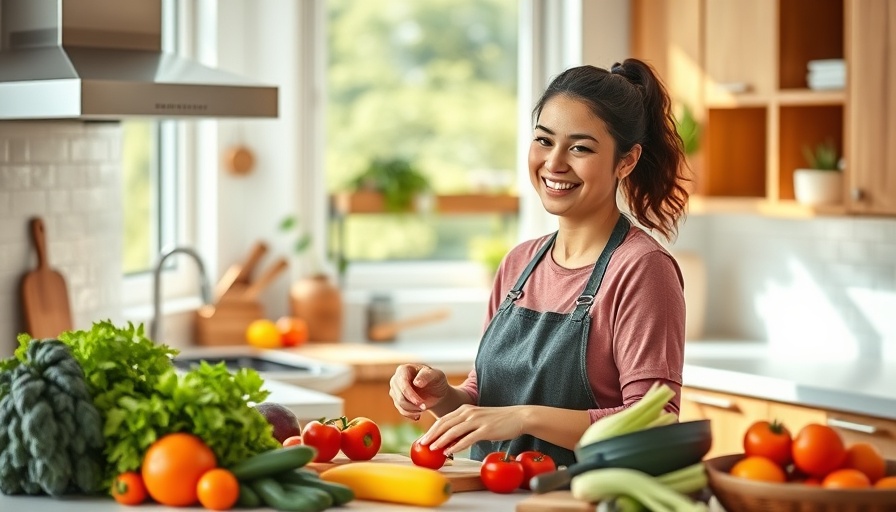
The Culinary Heart of Mexican Culture
Food is rarely just about sustenance; it encapsulates memories, traditions, and identities. For Ale Graf, cooking is a profound reflection of her Mexican heritage. During an enlightening conversation about food and the significance of National Hispanic Heritage Month, Ale emphasized how food is intertwined with love and community. She reminisced about her childhood spent in the kitchen with her mother, grandmother, and aunts, who treated recipes with the same reverence as precious heirlooms. Their shared meals became a way to nurture relationships, bridging the past with the present and offering a warm invitation to anyone who wishes to join at the table.
Transforming Tradition: Plant-Based Mexican Cuisine
Ale Graf has taken a unique path in her culinary journey by focusing on plant-based recipes that celebrate traditional Mexican flavors. Her own transformation in cooking began 23 years ago when her son developed a dairy allergy. This prompted her to explore vibrant spices and diverse vegetables, leading her not only to adapt but also to innovate. “I lead with flavor,” Ale explains, simplifying her vibrant dishes like bean soup into delightful surprises for those who shy away from plant-based labels.
This innovative approach aligns with a broader trend of embracing plant-based diets while honoring cultural heritage. The Mexican vegan movement flourishes in the United States, where chefs use staples such as masa, beans, and avocados to create fulfilling dishes that resonate without the need for animal products. Such shifts reflect the rich tapestry of Mexican culinary traditions, as noted by Anna Rios, a registered dietitian who emphasizes the importance of nutritious adaptations of beloved family recipes.
Bringing Back Traditional Flavors
Simply put, the ingredients at the heart of Mexican cuisine serve as a perfect foundation for plant-based meals. As Ale suggests, masa is essential, underpinning many cherished dishes from sopes to tamales. Its versatility offers an arena for creativity, allowing cooks to reinterpret classic meals using modern, health-conscious ingredients.
However, it's not just about creating vegan recipes; it's about spotlighting beloved Mexican ingredients such as nopales, chiles, and sophisticated spices. The recent surge in plant-based diets has created an opportunity to return these ingredients to the plate, encouraging individuals to explore traditional eating patterns that prioritize fresh produce and whole foods.
Communal Experiences through Food
This perspective aligns with Ale’s vision for encouraging healthier eating habits: shifting the focus from restrictive diets to creating one vibrant, healthy meal at a time. By integrating colorful fruits and vegetables into our meals, we foster a rediscovery of traditional Hispanic culinary practices that resonate deeply with the modern palate.
For Keith, a young student and aspiring chef, the idea of communal cooking speaks volumes. He expresses excitement about creating his own family recipes with a twist. “It’s about the experience of cooking together and cherishing those moments, just like Ale mentioned,” he says, capturing the essence of what it means to come together through food.
Actionable Steps Toward a Plant-Based Future
The journey to adopting a more plant-centered cuisine starts with awareness and willingness to experiment. Here are three strategies to incorporate flavorful plant-based Mexican dishes into your diet:
- Start Simple: Dive into vibrant Mexican ingredients. Explore traditional appetizers like salsa, guacamole, or sopes and opt for fresh vegetables and herbs.
- Explore Diverse Recipes: Find inspiration from chefs and dietitians like Ale and Anna, who create plant-based versions of classic dishes. Challenge yourself to recreate a family recipe using plant alternatives.
- Engage the Community: Share your food experiences with friends and family, inviting them to participate in cooking to foster connection and cultural appreciation.
The Future of Mexican Cooking
As we celebrate dishes inspired by rich Mexican traditions and innovations, it’s clear that the future of food lies in our shared experiences, vibrant palettes, and a commitment to health. As Ale Graf reminds us, food is an expression of love—a way to connect, honor our heritage, and find joy in every shared meal. Let’s embrace this culinary renaissance that pushes us into a more inclusive, sustainable, and delicious future.
 Add Row
Add Row  Add
Add 



Write A Comment